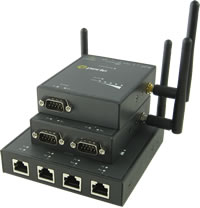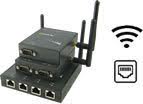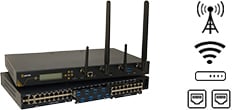Peer to Peer Connections
Advantages of using Software Access Point (SoftAP) over Legacy Ad Hoc Wireless Mode
For years, wireless applications that required a peer to peer connection, Ad Hoc mode was the only game in town. This convenient mode of operation enables wireless machine to machine connections by allowing two or more stations to communicate directly with each other without an access point routing their traffic.
However, ad hoc networks using WEP encryption may generate security risks because they do not employ any measures to authenticate users. This means that any station within range can connect to other stations that are configured to allow ad hoc networking.
According to the US Department of Commerce’s National Institute of Standards and Technology (NIST), hackers can exploit the IV portion of the RC4 key used in WEP, resulting in a passive attack that can recover the RC4 key after eavesdropping on the network. Depending on the amount of network traffic, and thus the number of packets available for inspection, a successful key recovery could take as little as one minute.
This legacy technology was therefore superseded by the stronger protection offered in the IEEE 802.11n standard, specifically WPA and later WPA2.
Benefits of SoftAP
SoftAP, used in peer to peer connects, offers a more modern improvement over ad hoc mode and includes an easier connection method.
- Secure: SoftAP offers the latest security based on the 802.11i standard.
- Easier to set up: Ad Hoc mode is complex and most vendor implementations are very difficult to set up. Someone who is not used to installing Ad Hoc networks will find the experience frustrating. Because SoftAP, in effect, operates as an access point, anyone who already knows how to setup wireless clients to Access Points can easily configure peer to peer connections using SoftAP.
- Investment Protection: Major WLAN chip manufacturers have recently discontinued the support for Ad Hoc on the release of their latest chip sets. This is surely a sign that Ad Hoc mode is going to disappear. Any wireless serial device server vendor out there still supporting Ad Hoc is using legacy chipsets.
SoftAP for up to 6 wireless clients is supported on the following products:





